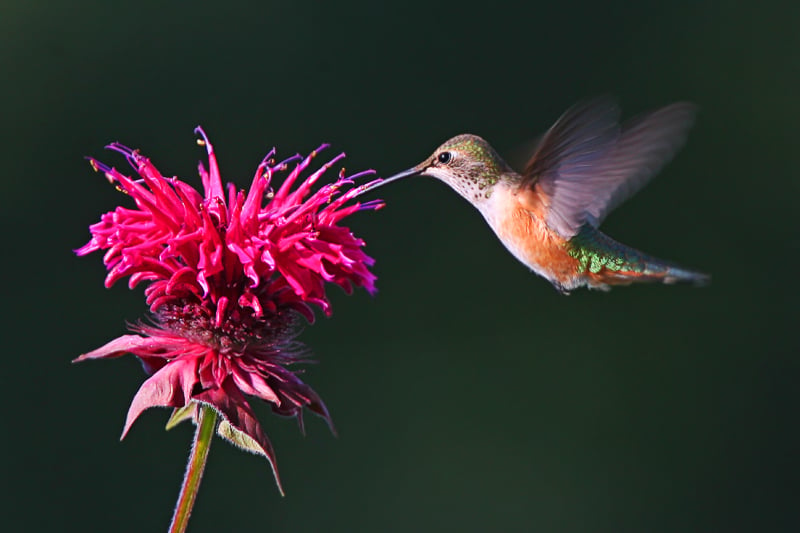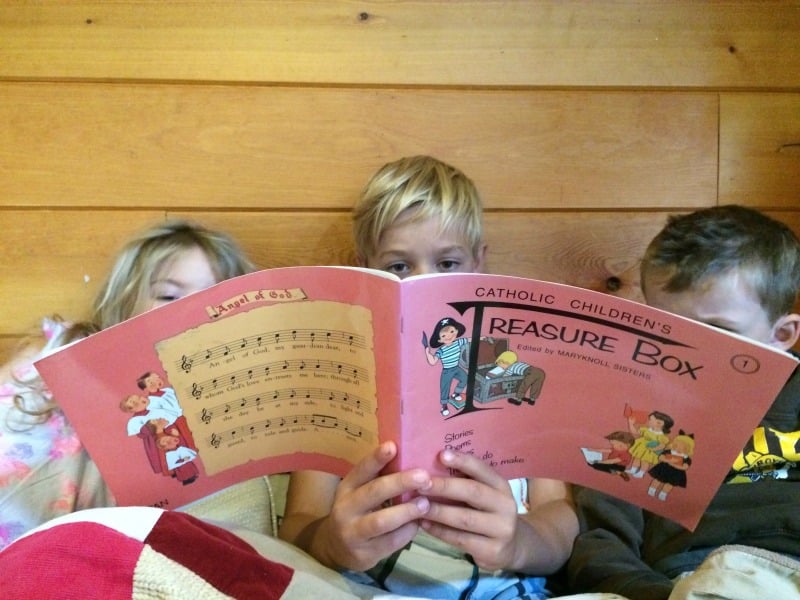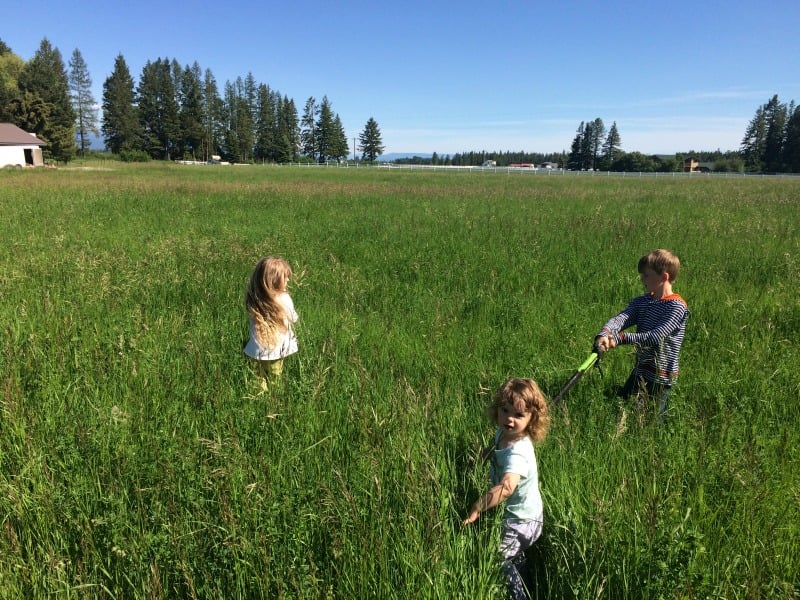 Copyright 2007 Janine Russell. Via
Flickr; all rights reserved.
Copyright 2007 Janine Russell. Via
Flickr; all rights reserved.
A Bergamot Moment is why I am homeschooling, again.
In my garden, right smack in the middle of the mounds of rows is a Bee Balm plant, red and tall. It’s there because I love its smell. It is also an attractant to butterflies and hummingbirds, and who doesn’t want to watch them flit, flutter and zip? I love the idea of my garden being a mini (micro) ecosystem, but not to the extent of inviting in deer. The children and I have watched the hummingbirds dart, settle, taste and flee from the Bee Balm. We have watched them fight with each other, claiming their nectar and chattering away noisily. This spring before the Bee Balm came back into bloom I noticed in another area of the garden a smell coming from the soil. The garden seemed dead yet there was a distinctive smell of potpourri. I was tickled with joy at the lingering scent of last year’s Bee Balm and went about collecting an apron full of spent seeds.
Those fallen seeds were not the only springtime delight in the garden. I also noticed on the other side of the gate, a little to the left, tucked behind the door, an unidentified herb. It seemed familiar, its leaves and even more so their smell, but I was unsure of its name. My mother taught me how to garden and was visiting. She recognized the plant’s square stalk as the same family as the Bee Balm and she had just read about the Native Americans in this area and the plant, Bergamot, used in the tea, Earl Grey. We filled our heads reading about its medicinal and practical uses and how the Blackfoot Indians used it as an antiseptic on wounds. I am quite pleased to know that Bee Balm is much more than an attractive center piece.
But I am not writing any of this to talk about red flowers; rather, about why I am homeschooling, again.
My father just asked me that very question and I gave him a generic answer, maybe a standard, “you’ll be comfortable with this one” kind of answer. I said, “Ummm, because there are like almost 30 kids in a class at the public school.”
He said, “Well there were 40 when I was a kid.”
I looked at my mom for her classic roll of the eyes at his exaggeration and yet she agreed and added, “Or 50; it was Catholic school and they filled the seats and the rooms. I don’t remember any kids ever getting out of hand or out of line.”
I continued with, “Well you can’t go to church in the morning at public school and I don’t like the curriculum and I haven’t been pleased with what I see; I mean even the Christmas shows are unimpressive.”
I was looking for some agreement from them, some common ground to work with since I knew they questioned if I was cut out for homeschooling.
What was I talking about, rambling on with answers that were, yes, concerns of mine but not really why I wanted to say, "See ya later!" to the chaos of the public school system? What I really wanted to say was, “The school asks for all our time and there’s no time left for Jesus.” I mean it isn’t about being unimpressed, it is about lacking meaning. My kids are gone from 8 AM to 4 PM; when is there time for family, for unrestricted play and discover, for prayers, for chewing your food slowly and for aimless wonder?
I am, once again, quitting school (we have done it all; parochial, public and Christian). I want my children to have a Bergamot moment; unplanned, undocumented, real learning. I want them to discover and follow their own rabbit paths. I want to foster in them a love of learning with Christ at the heart of it all. I want them to feel, see, and smell God’s creation. I don’t want the government’s agenda to be more important than God’s.
When I read mission statements like that of Gregory the Great Academy's and the statement at Wyoming Catholic College, "Steeped in Wonder, Formed in Wisdom" I long to follow in their footsteps. When I read Anthony Esolen's thoughts and ideas about restoring education, authentic man and womanhood, restoring beauty, rediscovering our history and rejecting the current worldview and its lies, I get very excited to begin, to nurture in my children all that our wonderful faith holds. I imagine them being steeped in music, nature, classics, great books, Latin, mental and physical challenges, and virtue.
I want my family to put on the armor of Christ and be bold, to fall madly in love with our Church, to have fun, be joyful, experience life and the truth of our Church's teachings. I don't know how they/we can do that without setting ourselves apart. I don't believe you can fiercely maintain your faith being in the public school system or even in a Christian school.
I want my children to understand and act on Charlotte Mason’s motto, “I am, I can, I ought and I will” as they respond to their tasks in front of them, as they’re challenged and as a response to their calling. Charlotte Mason’s approach speaks to my heart she wrote, “Of the three sorts of knowledge proper to a child, the knowledge of God, of man, and of the universe--the knowledge of God ranks first in importance, is indispensable, and most happy-making.”
The pressures in the public schools to be cool are stronger than the gratitude for being clothed, fed, and warm, greater than valuing the person, it seems. The emphasis put on kids to be kind and nice is spoken in words, yet truth is relative and the reason for treating others with love mute. I want my children to be grateful, good and generous because we follow Christ. The thoughts that fill their head must be rightly guided. “Thought breeds thought; children familiar with great thoughts take as naturally to thinking for themselves as the well-nourished body takes to growing; and we must bear in mind that growth, physical, intellectual, moral, spiritual, is the sole end of education.” Charlotte Mason.
[tweet "I want my children to be grateful, good and generous because we follow Christ."]
Charlotte Mason experienced that children have the need to be stimulated from an early age by a broad curriculum, not simply to be trained to read, write and count. She believed the best curriculum was one that contained the best literature, the best art, the best contemporary science and nothing mediocre.
A “living” education as defined by Charlotte Mason is one where a child is exposed to and acquainted with a large and various amount of “things and thoughts.” The child is educated through the use of many living books, the study of nature, physical exercise, handicrafts, science, art and music. She taught that ideas were the food of the mind and that it was of the utmost importance that children be given a wide and varied diet of this essential food. Through the use of living books, real life experiences and conversations, a child’s mind should be fed on the good and the sublime, the honorable and true.
It isn't the same to know about something as it is to know something. A walk in the woods is to know the woods, to smell it, feel it and learn to love it. I want to raise my children nourished by the soil that we fertilize with prayers, penance and praise, to know God.
That night after the dishes were washed, the evening conversation with my parents dwindling down to plans for tomorrow and wrapping up the day as a good one, I gathered those spent Bergamot seeds from my apron, I tucked them under my pillow and dreamed of warm soil, adventurous days and the honor of raising souls for heaven. I pray these little souls will be a living example of why we choose to educate differently. I pray God shows us many lessons in His creation and through His grace and guidance.
Will you have a bergamot moment today, discovering something unknown and filling your senses with God’s creation?
Copyright 2017 Maggie Eisenbarth
About the Author
Maggie Eisenbarth
Maggie is the mother of nine children. She longs to do God’s will, seek His truth and wrap it all up in a life of joy, offering hope to others. Her family is living the simple life; community, bonfires, good food and nature. She is working on a memoir, writing about how God’s grace and His Church freed her from the bondage of our culture. Follow her on Instagram @ 11arrows11.




.png?width=1806&height=731&name=CatholicMom_hcfm_logo1_pos_871c_2728c%20(002).png)
Comments